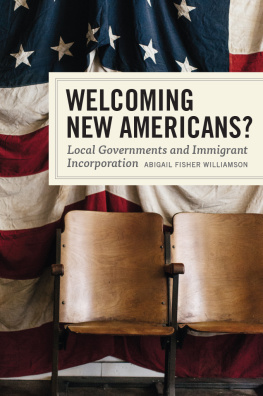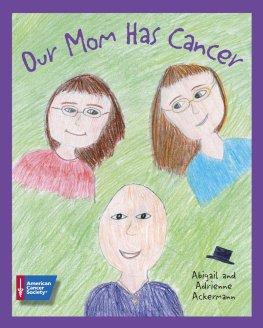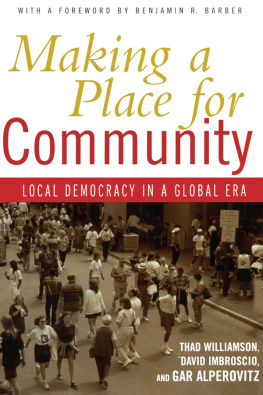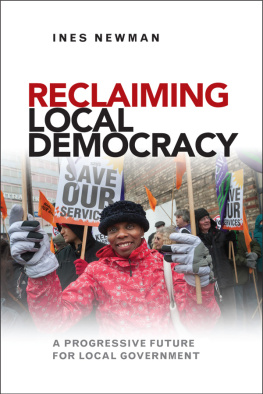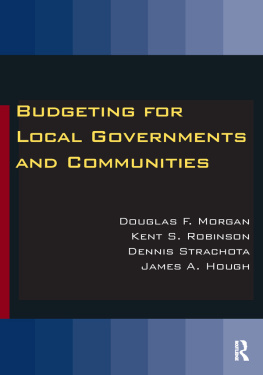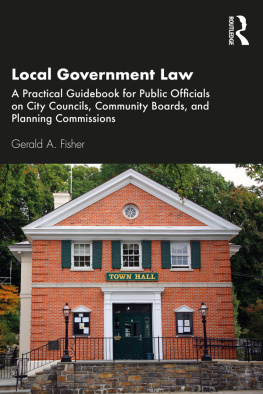The University of Chicago Press, Chicago 60637
The University of Chicago Press, Ltd., London
2018 by The University of Chicago
All rights reserved. No part of this book may be used or reproduced in any manner whatsoever without written permission, except in the case of brief quotations in critical articles and reviews. For more information, contact the University of Chicago Press, 1427 E. 60th St., Chicago, IL 60637.
Published 2018
Printed in the United States of America
27 26 25 24 23 22 21 20 19 18 1 2 3 4 5
ISBN -13: 978-0-226-57251-2 (cloth)
ISBN -13: 978-0-226-57265-9 (paper)
ISBN -13: 978-0-226-57279-6 (e-book)
DOI : https://doi.org/10.7208/chicago/9780226572796.001.0001
Library of Congress Cataloging-in-Publication Data:
Names: Williamson, Abigail Fisher, author.
Title: Welcoming new Americans? : local governments and immigrant incorporation / Abigail Fisher Williamson.
Description: Chicago ; London : The University of Chicago Press, 2018. | Includes bibliographical references and index.
Identifiers: LCCN 2018000464 | ISBN 9780226572512 (cloth : alk. paper) | ISBN 9780226572659 (pbk. : alk. paper) | ISBN 9780226572796 (e-book)
Subjects: LCSH : ImmigrantsGovernment policyUnited States. | United StatesEmigration and immigrationGovernment policy. | Urban policyUnited States. | Municipal governmentUnited States.
Classification: LCC JV 6483 . W 54 2018 | DDC 325.73dc23
LC record available at https://lccn.loc.gov/2018000464

This paper meets the requirements of ANSI/NISO Z 39.48-1992 (Permanence of Paper).
This book argues that despite challenging fiscal environments and the turbulent political rhetoric surrounding immigration, local government officials in cities across the United States tend to welcome rather than oppose the presence of immigrants. I was a beneficiary of this welcome when I arrived as a stranger to conduct research in several small US cities. Hundreds of people took time out of their busy lives to speak with me. Since I promised not to reveal the identities of those I interviewed, I cannot thank them by name. Nonetheless, I am grateful to those who accepted unsolicited phone calls and e-mails and invited me to luncheons, meetings, or coffee klatches or welcomed me into their homes. I am particularly grateful to those who made lists of others to interview, contacted colleagues on my behalf, or allowed me to use their names in reaching out to acquaintances. Several organizations and individuals helped me reach informants, including David Brewster, Marvin Druker, Luis Fraga, Meredith Jones, Margaret Levi, Sylvia Puente, Betty Robinson, Adele Simmons, Steven S. Smith, Jean Teahan, and the Grand Victoria Foundation. In addition, I appreciate the more than five hundred officials who took the time to complete my survey. The unstinting willingness of all of these individuals made my job inestimably easier and truly enjoyable.
I am also grateful for funding from several sources. This book was made possible in part by financial assistance from the Ruth Landes Memorial Fund, a program of the Reed Foundation. At earlier stages of the project I received assistance from Harvards Ash Center for Democratic Governance and Innovation, Center for American Political Studies, Hauser Center for Nonprofit Organizations, and Taubman Center for State and Local Government. The Maine Community Foundation and the Libra Foundations Fitzgerald Gubernatorial Fund for Maine supported research in Lewiston. The ZEIT-Stiftung Bucerius Scholarship in Migration Studies offered both financial support and the valuable opportunity for feedback from young and established migration scholars.
I owe special thanks to Robert D. Putnam, Archon Fung, Jennifer Hochschild, and Mary Waters, who nurtured this project in its earliest stages. All of them provide tremendous models of using rigorous scholarship to further the public good. Their generous mentorship and insights strengthened this work. I owe a particularly large debt to Bob, who introduced me to the fertile theoretical ground of new immigrant destinations, let me make the project my own, and worked with my committee to identify resources that allowed me to complete the project with year-old twins.
In addition to support from these excellent mentors, I have been fortunate to present elements of this project at several conferences and receive feedback from a generous community of scholars, including Tony Affigne, Richard Alba, Ryan Allen, Gustavo Cano, Porsha Cropper, Els de Graauw, Katherine Fennelly, Michael Jones-Correa, Rey Koslowski, Jonathan Laurence, Peggy Levitt, Rahsaan Maxwell, John Mollenkopf, Karthick Ramakrishnan, Audrey Singer, Rogers Smith, Justin Steil, Jessica Trounstine, Steve Vertovec, Stephen Wasby, Michael Werz, and Cara Wong. Harvards Migration and Immigrant Incorporation Seminar deserves special recognition as a congenial environment where I presented this research several times. I likewise owe special thanks to Debbie Schildkraut, who generously read and commented on the entire manuscript as part of a book workshop. My graduate school friends and collaborators provided insight and camaraderie, including Hamutal Bernstein, Anna Boucher, Ina Ganguli, Justin Grimmer, Daniel Hopkins, Helen Marrow, and Van Tran.
At Trinity College, I am lucky to have found a supportive administration, generous colleagues, and engaging students. I am grateful to the Faculty Research Committee for financial support, as well as to Dean Melanie Stein and Kristin Magendantz for helping me to attract funding that allowed additional time for writing. My colleagues provide both intellectual stimulation and thoughtful advice about academic life, including Ned Cabot, Benjamin Carbonetti, Sonia Cardenas, Andrew Flibbert, Isaac Kamola, Thomas Regan-Lefebvre, Reo Matsuzaki, Lida Maxwell, and Rachel Moskowitz. Special thanks to Rachael Barlow, Stefanie Chambers, Diana Evans, Adrienne Fulco, and Serena Laws, who assisted with my survey or commented on various chapters, and particularly to Kevin McMahon, Anthony Messina, and Nichole Szembrot, who read the entire manuscript as part of a book workshop sponsored by Trinitys Institute for Interdisciplinary Studies. Javier Arroyo, Phil Duffy, Curt Leonard, David Tatem, Rob Walsh, and Mary Beth White provided valuable technological or administrative support.
Trinity has also generously funded several undergraduate research assistants, who have made essential contributions to this project, including Tasmiah Ahmad, Nour Chamseddine, Magdalena Filippone, Kaitlyn Sprague, Raekwon Wheeler, and especially Bettina Cecelia Gonzalez and Brooke Williams. My doctoral student at Harvard, Shanna Weitz, likewise provided vital assistance. For translation assistance, I am grateful to Bridges Language, Training, and Staffing in Elgin and to Alba Enterprises in Yakima, as well as to Mara Chvez. Deb Altman provided rapid, precise transcriptions.
At the University of Chicago Press, I am indebted to my editor, Chuck Myers, for his insightful questions and comments. Alice Bennett provided meticulous copyediting. Two thoughtful anonymous reviewers likewise improved the manuscript with their suggestions. A portion of appeared as Mechanisms of Declining Intra-ethnic Trust in New Immigrant Destinations in the
 This paper meets the requirements of ANSI/NISO Z 39.48-1992 (Permanence of Paper).
This paper meets the requirements of ANSI/NISO Z 39.48-1992 (Permanence of Paper).
